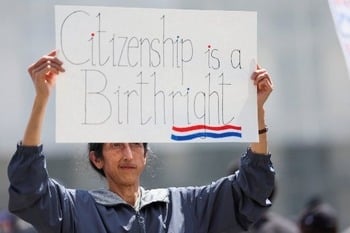-
 August 11, 2025By Kate Scanlon, OSV News(OSV News) -- A federal judge in Maryland ruled Aug. 7 the Trump administration cannot withhold citizenship from children born in the U.S. to parents without legal status or temporary visa holders.
August 11, 2025By Kate Scanlon, OSV News(OSV News) -- A federal judge in Maryland ruled Aug. 7 the Trump administration cannot withhold citizenship from children born in the U.S. to parents without legal status or temporary visa holders.
It marks the fourth such ruling since the U.S. Supreme Court issued a related ruling regarding Trump's executive order in June that limited the ability of federal judges to issue nationwide injunctions, but indicated such challenges could continue as class-action suits.
U.S. District Judge Deborah Boardman in Greenbelt said her ruling blocking the order as part of a class-action suit "comports with old and recent Supreme Court precedent."
"Here, the Court finds that the only way to afford complete relief to the certified class is to enjoin enforcement of the Executive Order as to each member of the class," Boardman wrote. "That relief must include every child in the United States who is subject to the Executive Order. After all, the Executive Order does not target only children born in Maryland; it seeks to deny citizenship to 'persons born in the United States.' Anything less than classwide relief would not provide complete relief to the class."
Plaintiffs and class counsel in CASA v. Trump celebrated the ruling.
"I am proud to be a class representative in this lawsuit, and I will continue to proudly represent other families like mine who are fighting for their children's constitutional rights," Liza, a plaintiff in the lawsuit and member of the Asylum Seeker Advocacy Project identified by her first name, said in a statement. "Today's decision affirms that U.S.-born children have a constitutional right to U.S. citizenship, regardless of their parents' immigration status."
"Judge Boardman's rulings make clear that, after the Supreme Court's decision limiting universal injunctions, a preliminary injunction protecting all members of the plaintiff class -- all babies born or who will be born in the U.S. and to whom the Executive Order would otherwise apply -- is necessary to ensure that no one loses their constitutionally guaranteed citizenship under this blatantly unlawful Executive Order," William Powell, senior counsel at the Institute for Constitutional Advocacy and Protection at Georgetown University, added. "We look forward to continuing to protect the right to birthright citizenship that the Constitution provides."
In its June ruling, the Supreme Court did not directly rule on the constitutionality of Trump's executive order itself. Justice Amy Coney Barrett wrote for the majority that "when a court concludes that the Executive Branch has acted unlawfully, the answer is not for the court to exceed its power, too."
Trump's order, which is part of his administration's broader effort to implement his hardline immigration policies, seeks to end birthright citizenship for children born in the U.S. to parents without legal status or to temporary visa holders.
The order is among the Trump administration's immigration actions that have been met with criticism from the U.S. bishops.
Others have criticized the order as well, calling it a violation of the Constitution's 14th Amendment, which states, "All persons born or naturalized in the United States, and subject to the jurisdiction thereof, are citizens of the United States and of the State wherein they reside."
